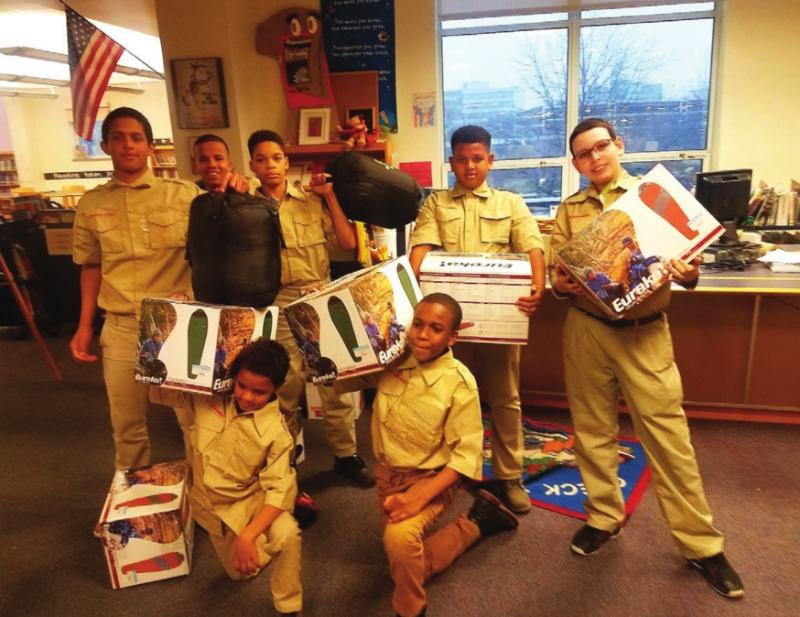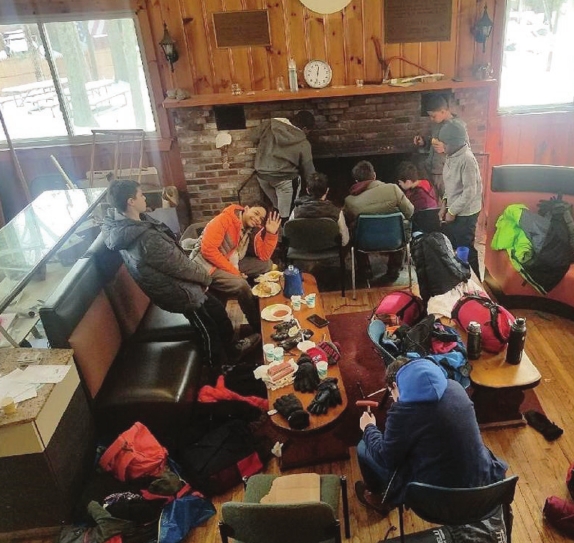
Members of the Scouts BSA Troop 906 at their Orchard Gardens location.

Scouts gather in their Blue Hills clubhouse
On a clear, chilly Friday afternoon a group of adolescent boys from the Orchard Gardens K–8 Pilot School trudge through layers of ice and snow along a worn hiking trail. Along the way, they pause to analyze animal tracks, ponder good places to setup camp, and start snowball skirmishes.
The group — Scouts BSA Troop 906 — is the newest addition to Boy Scouts by way of Beacon of Freedom, an urban outreach initiative that stretches across northeastern Massachusetts and seeks to engage new members and families in scouting. The unit, formed last September, is one of only two majority-minority Scouts BSA troops in the region. Officials say it has about 20 members, including three girls.
Any other day, members might be at home in Roxbury, but on this day, they’ve practiced lighting a fire without matches, cooked lunch on their own and tested for CPR certification alongside other campers at the New England Base Camp in Milton. They regroup for a 20-minute hike to a clearing where they practice signaling for help using objects in the wilderness. After their day of adventure, they pile into a van and head back home to the city.
“I wanted to learn new things like how to help people, how to cook and swim,” said 8th-grader Wagner M. Baessa-Landin in an interview.
Baessa-Landin, 13, was born in Portugal and didn’t know much about scouting until a school official suggested joining. He’s now a troop patrol leader, and although he hasn’t learned how to swim, he is learning other things.
“I learned how to cook outside and work as a team with my friends,” he said when asked about his favorite newly acquired skill.
“I learned how to save myself if I’m choking,” said a giggling Paulo Dacosta, 12, after a lesson about first aid and the Heimlich maneuver.
Other scouts name new skills and experiences they’ve acquired: archery, rope-tying and less tangible lessons about character and values.
Adult leader Nicholas Kerpan has been involved with the troop since it was chartered. He explained Beacon of Freedom’s outreach as a matter of “getting the message of scouting, getting access to all the cool things you can do in scouting, out to people without excluding them because they don’t have the time or the money to do it themselves.”
Kerpan, 30, and other scouting officials say when it comes to forming inner-city troops like 906, limited family resources and little knowledge of scouting can be barriers. Beacon of Freedom is working to change that by hiring staff and lending financial assistance to cover costs for things like registration and scouts’ outdoor trips.
“The biggest thing we had to do was let people know what it was and pick a time that’s convenient for them to meet,” Kerpan said. “From then, it’s just been a matter of working together with the teachers and the other adult leaders and the scouts themselves to figure out what exactly a scout troop looks like and what their roles and responsibilities are.”
The girls in the troop weren’t available for interviews, but officials say their inclusion hasn’t brought challenges. Instead, the troop’s unique demographics are forcing Beacon of Freedom to confront stereotypes and face other cultural challenges.
In neighborhoods with large immigrant populations like Roxbury and Dorchester, parents from various parts of the world sometimes are hearing about it for the first time, or, view it warily.
“A while back I had a volunteer that actually mentioned that in some countries, especially in Latin America, they look at scouting as a bridge to get into the military,” said Komba Lamina, chief diversity officer and urban scouting and exploring executive. “The advice was, ‘Don’t use a uniform right at first, because you want to be able to explain to parents and let them know this is not what this is.’” Even though the scouting movement began with a British war hero’s publication of a soldier’s field manual, the present-day Boy Scouts of America says its only connection to the military is shared values.
“The BSA has a proud history of supporting America’s service members and veterans. Our youth members learn the importance of duty to country and honoring the people who serve our nation as part of the values outlined in the Scout Oath and Law,” the organization said in a statement to WGBH News. “It is important to note that while the BSA does teach the importance of honoring members of our military, it is a completely independent organization, and the BSA does not provide a recruitment platform for the U.S. armed forces.”
Despite the cultural gaps, Lamina says the next phase in solidifying the troop is getting parents to run the program. He knows that’s a longer-term goal.
“Folks are not just gonna come in and say, ‘Oh yeah, this is good. This is working out, let me just jump into it.’ So you first have to build that trust,” he explained “and also establish consistency, so that folks know that you’re there to stay.”
Meanwhile, some scouts from Troop 906 are already contemplating the intangible lessons they’re learning and thinking about higher roles within the organization.
“I want to be a scoutmaster, then I can do that, like I will learn how to do all the stuff and help kids out, and like, I will be bossy sometimes, but I will be fun at the same time,” said Baessa-Landin.
When asked what he’s learning as a scout leader, Lucio DePina, 13, said, “I have to be trustworthy, and I have to help my friends and be kind.”
Saraya Wintersmith covers Dorchester, Mattapan and Roxbury for WGBH News.